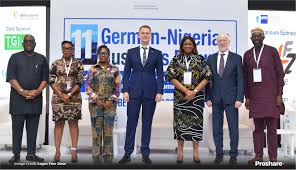The Chief Executive Officer of Lagos Free Zone (LFZ), Adesuwa Ladoja, says that the LFZ with its deep sea port and world-class infrastructure is an enabler for German businesses seeking growth opportunities in Nigeria and across the West African region.
Addressing the 11th German-Nigeria Business Forum in Lagos, Ladoja said that the free zone “remains the only free zone in Nigeria that is integrated with a deep sea port and equipped with world-class infrastructure and facilities that can help businesses thrive.”
According to her, the LFZ features include a deep sea port, which positions it as strategic and comprehensive ecosystem, allowing businesses to thrive with minimal risks for investments.
She explained that the LFZ is a strategic choice for companies seeking industrial expansion.
Ladoja said in a statement that trade between Nigeria and Germany rose to $3bn in 2023, indicating the importance of the LFZ to Nigeria’s collaboration with German businesses.
She stated that a multinational, BASF, leveraged LFZ’s ecosystem for sustainable growth in Nigeria.
Ladoja explained that by establishing operations in the Free Zone, BASF has enhanced its competitive edge while aligning with Nigeria’s ambitions for industrialisation and diversification of its economy,
She urged potential investors to see Nigeria not just as a market, but as a launching pad for long-term growth across the region.
The LFZ CEO disclosed that the free zone has attracted approximately $2.75 billion in investments from global companies and urged German businesses to seize the opportunities in Nigeria, using LFZ as a platform for regional expansion.
Local media reports said that the German-Nigeria Business Forum, themed ‘Building Effective Partnership for Successful Business Development,’ featured a panel session on ‘Agribusiness, Food Manufacturing and Processing.’
GIK/APA


